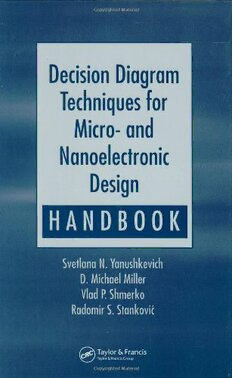Download Decision Diagram Techniques for Micro- and Nanoelectronic Design Handbook PDF Free - Full Version
Download Decision Diagram Techniques for Micro- and Nanoelectronic Design Handbook by Svetlana N. Yanushkevich, D. Michael Miller, Vlad P. Shmerko, Radomir S. Stankovic in PDF format completely FREE. No registration required, no payment needed. Get instant access to this valuable resource on PDFdrive.to!
About Decision Diagram Techniques for Micro- and Nanoelectronic Design Handbook
Decision diagram (DD) techniques are very popular in the electronic design automation (EDA) of integrated circuits, and for good reason. They can accurately simulate logic design, can show where to make reductions in complexity, and can be easily modified to model different scenarios.Presenting DD techniques from an applied perspective, Decision Diagram Techniques for Micro- and Nanoelectronic Design Handbook provides a comprehensive, up-to-date collection of DD techniques. Experts with more than forty years of combined experience in both industrial and academic settings demonstrate how to apply the techniques to full advantage with more than 400 examples and illustrations. Beginning with the fundamental theory, data structures, and logic underlying DD techniques, they explore a breadth of topics from arithmetic and word-level representations to spectral techniques and event-driven analysis. The book also includes abundant references to more detailed information and additional applications.Decision Diagram Techniques for Micro- and Nanoelectronic Design Handbook collects the theory, methods, and practical knowledge necessary to design more advanced circuits and places it at your fingertips in a single, concise reference.
Detailed Information
| Author: | Svetlana N. Yanushkevich, D. Michael Miller, Vlad P. Shmerko, Radomir S. Stankovic |
|---|---|
| Publication Year: | 2005 |
| ISBN: | 9781420037586 |
| Pages: | 952 |
| Language: | English |
| File Size: | 7.214 |
| Format: | |
| Price: | FREE |
Safe & Secure Download - No registration required
Why Choose PDFdrive for Your Free Decision Diagram Techniques for Micro- and Nanoelectronic Design Handbook Download?
- 100% Free: No hidden fees or subscriptions required for one book every day.
- No Registration: Immediate access is available without creating accounts for one book every day.
- Safe and Secure: Clean downloads without malware or viruses
- Multiple Formats: PDF, MOBI, Mpub,... optimized for all devices
- Educational Resource: Supporting knowledge sharing and learning
Frequently Asked Questions
Is it really free to download Decision Diagram Techniques for Micro- and Nanoelectronic Design Handbook PDF?
Yes, on https://PDFdrive.to you can download Decision Diagram Techniques for Micro- and Nanoelectronic Design Handbook by Svetlana N. Yanushkevich, D. Michael Miller, Vlad P. Shmerko, Radomir S. Stankovic completely free. We don't require any payment, subscription, or registration to access this PDF file. For 3 books every day.
How can I read Decision Diagram Techniques for Micro- and Nanoelectronic Design Handbook on my mobile device?
After downloading Decision Diagram Techniques for Micro- and Nanoelectronic Design Handbook PDF, you can open it with any PDF reader app on your phone or tablet. We recommend using Adobe Acrobat Reader, Apple Books, or Google Play Books for the best reading experience.
Is this the full version of Decision Diagram Techniques for Micro- and Nanoelectronic Design Handbook?
Yes, this is the complete PDF version of Decision Diagram Techniques for Micro- and Nanoelectronic Design Handbook by Svetlana N. Yanushkevich, D. Michael Miller, Vlad P. Shmerko, Radomir S. Stankovic. You will be able to read the entire content as in the printed version without missing any pages.
Is it legal to download Decision Diagram Techniques for Micro- and Nanoelectronic Design Handbook PDF for free?
https://PDFdrive.to provides links to free educational resources available online. We do not store any files on our servers. Please be aware of copyright laws in your country before downloading.
The materials shared are intended for research, educational, and personal use in accordance with fair use principles.

